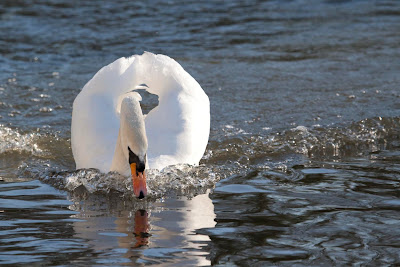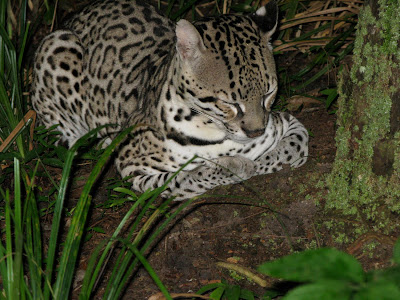 Coot on Lonely's ramp
Coot on Lonely's rampI doubt whether Lonely liked the coot using her plank as a place to preen when it came off its nest, but the coot's presence was advantageous in one way. While it 'stood guard' on the plank no other ducks dared attack Lonely. However, I saw a most unusual sight one evening while Lonely was off her nest and the coot was absent. I noticed a male mandarin duck standing on the plank and then, to my amazement, saw its mate come out from inside Lonely's box. What on earth she was doing entering another duck's nest is beyond my comprehension.
When Lonely's mate wasn't around she was sometimes dragged off her nest by one of the 'waiters'. Below you can see her swimming back to her nest with her mate.
On the days immediately preceding the hatching of the ducklings, Lonely's mate stood guard on the plank most of the time. While she and her mate were away feeding on Thursday evening, we peeked inside her box and counted five ducklings and some eggs still to hatch, so we knew the ducklings would emerge on the following day. Lonely had been excellent at protecting her nest so we had high hopes that she would be a good mother. How wrong can one be? At around lunchtime on Friday, after many failed attempts to lure her ducklings from the safety of their nest box, Lonely eventually coaxed one out.
When Lonely's mate wasn't around she was sometimes dragged off her nest by one of the 'waiters'. Below you can see her swimming back to her nest with her mate.
On the days immediately preceding the hatching of the ducklings, Lonely's mate stood guard on the plank most of the time. While she and her mate were away feeding on Thursday evening, we peeked inside her box and counted five ducklings and some eggs still to hatch, so we knew the ducklings would emerge on the following day. Lonely had been excellent at protecting her nest so we had high hopes that she would be a good mother. How wrong can one be? At around lunchtime on Friday, after many failed attempts to lure her ducklings from the safety of their nest box, Lonely eventually coaxed one out.
 Lonely with two ducklings
Lonely with two ducklingsThere were nine ducklings in all but only one other emerged from the box. The rest refused to budge and, after about 10 minutes of calling to them Lonely seemed to get bored. She and her mate swam upstream with the two ducklings, leaving the rest in the box.
 Lonely with four
Lonely with fourAbout three hours later Lonely returned minus the ducklings and coaxed out four more ducklings. We hoped that she had left the other two in a safe place but she showed no signs of going back upstream. She then swam off with the four, leaving three more in the box. While she was hanging around she was attacked by four 'waiters' and I had to chase them off. By this time the ducklings were scattered and I feared that the coot would attack them. Lonely did return and collect them and that was the last we saw of them!
By late afternoon, I heard a duckling in distress and Dave managed to catch it in a net so that we could return it to the box. Just as we were about to do so, Lonely returned and we just had time to put back the duckling before she went into the nest box. She now had just three ducklings and when they finally emerged and swam round to the back with her we weren't hopeful that they would survive. I think Lonely was attacked again and flew off and we never saw the ducklings again. She returned to her nest to check whether there were any left but, basically, all nine had disappeared in the space of a day and a half. Ironically, Lonely has started inspecting the neighbouring nest box, no doubt for a second attempt at rearing young!
Our duck in a basket however, is getting more used to us being around. Below you can see her preparing to head back to her nest in the hanging basket.
By late afternoon, I heard a duckling in distress and Dave managed to catch it in a net so that we could return it to the box. Just as we were about to do so, Lonely returned and we just had time to put back the duckling before she went into the nest box. She now had just three ducklings and when they finally emerged and swam round to the back with her we weren't hopeful that they would survive. I think Lonely was attacked again and flew off and we never saw the ducklings again. She returned to her nest to check whether there were any left but, basically, all nine had disappeared in the space of a day and a half. Ironically, Lonely has started inspecting the neighbouring nest box, no doubt for a second attempt at rearing young!
Our duck in a basket however, is getting more used to us being around. Below you can see her preparing to head back to her nest in the hanging basket.
















































